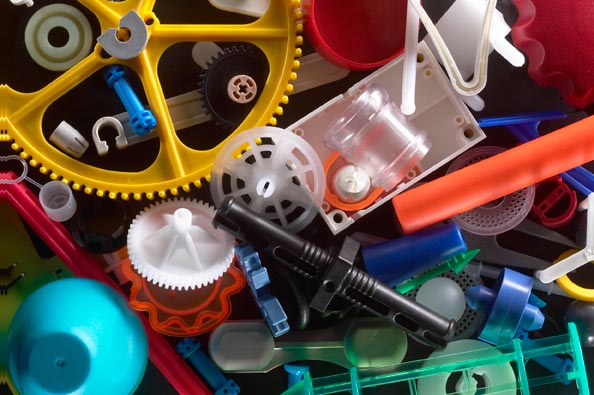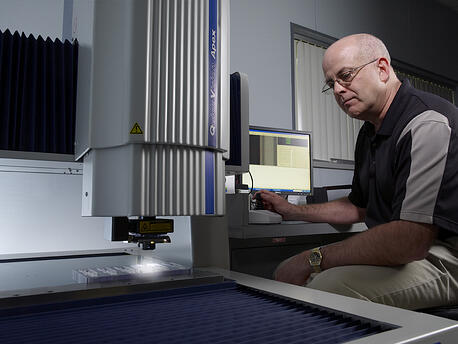Like anything in life, there are degrees of perfection. This is true in plastic injection molding. Some molders specialize in lower volume parts that don’t require a high level of detail or precision. This type of manufacturing may be suitable as some projects don’t require a perfect part based on the application.
Take disposable cutlery for instance. Because of its “use and toss” status in this world, plastic knives and forks don’t need to maintain a high level of perfection. They can have a bit of flash around the perimeter, and no one gives it a second thought.
 However, parts that need to meet exact standards are a very different story. When you need precision parts, you need to use a precision molder. These craftspeople are trained to build molds within very tight tolerances. They take into consideration the part complexity, the material used as well as the final application of the part to determine the best approach for manufacturability.
However, parts that need to meet exact standards are a very different story. When you need precision parts, you need to use a precision molder. These craftspeople are trained to build molds within very tight tolerances. They take into consideration the part complexity, the material used as well as the final application of the part to determine the best approach for manufacturability.
Here are excerpts from three customer case studies that show how The Rodon Group was able to meet the customer’s needs for their high-quality, precision parts.
Case Study: Plastic Injection Molded Residential Window Hardware
The Rodon Group was contracted to revise the injection molding process for a major door and window industry customer. Their residential window hardware was originally manufactured in-house, using a family of tools that produced units of diminished quality. In order to optimize part function and processing parameters, our expert staff used state of the art software to analyze and modify part prints, models, and samples, to arrive at the most cost effective, high-quality design possible. The tooling was completely redesigned, creating dedicated multi-cavity tooling that would yield higher quality parts at a better cost than the previous process. Utilizing advanced 46 to 233 ton Nissei presses, we developed an injection molding process employing nylon, vinyl, polypropylene, and polycarbonate materials to manufacture the parts. A tight tolerance of ± 0.005" was held while producing parts ranging from 3/8" diameter to 4" square in size, and 0.03 grams to 20 grams in weight. The parts were manufactured in both a glossy and textured finish. Parts were subjected to first piece and routine in-production inspections to verify accuracy and quality.
Case Study: Plastic Injection Molded Point-of-Purchase Display Components
The project highlighted here demonstrates The Rodon Group's ability to provide value added services that equate to cost savings over the life of a product. A leader in the point-of-purchase display industry recently turned to us to design and build molds around various pre-designed parts. This project included pegboard hooks, shelf dividers, and product stops.
By using a pre-designed part, we were able to design for manufacturability by maximizing the molds to produce higher quality and quantity parts. Injection molds made for high-production and tight tolerances are not inexpensive, however, the upfront cost is mitigated by superior product quality and long-lasting performance. The molds were fabricated using EDM (electrical discharge machining); this advanced process allowed for the creation of a highly polished finish and tolerances of ±.005". In addition to the design and fabrication of the molds, we also provided the injection molding. Manufacturing was done on Nissei presses; the parts were composed of various commodity and engineering grade resins, and varied in weight from 1 to 35 grams.
Case Study: Plastic Injection Molded Polystyrene Diagnostic Kit for the Medical Industry
A manufacturer of medical and diagnostic equipment recently contracted The Rodon Group to create the dies and provide injection molding for a lateral flow in-vitro diagnostic test cartridge. The cartridge would be composed of a medium impact polystyrene with dimensions of 5/16" x 7/8" x 3 ¾". The finished part would have a matte finish and weigh 8 grams.
At Rodon, we have specialized in the fabrication of high-quality molds and injection molded products since 1956. The molds for this project were designed for long service life and consistent results. Designed and fabricated to enhance the manufacturability of the parts, this equated to a higher quality part at a lower part weight and cost: a win-win scenario for this customer's price point.
The parts were injection molded on 177 ton Nissei hydraulic presses, which is equipped with a vision inspection system, ensuring that 100% of the parts were inspected. As with most precision molders, we take quality seriously. Our facility is ISO9001:2008 certified and we are also in compliance with 21CFR820- FDA quality system regulations, as well as ISO 13485 with the use of MasterControl.
These case studies should help designers and engineers understand the complexity and knowledge needed to create true precision parts consistent with quality. Highlights of these projects including processes, material and equipment used and standards met can be found at www.rodongroup.com/services-products/custom-molding-case-studies.









Comments